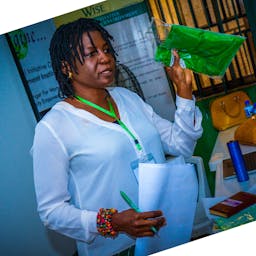UH-OH, OVER TIME THE COP HAS BEEN LOPE-SIDED!
Nov 26, 2023
Story
Seeking
Visibility

Photo Credit: Women INitiative for Sustainable Environment's media
Pre COP28 rally
The COP meets every year unless the Parties decide otherwise. Parties to the Convention that are not Parties to the Paris Agreement are able to participate in the Conference of the Parties serving as the meeting of the Parties to the Paris Agreement (CMA) as observers, but without the right to take decisions. The Paris Agreement is a legally binding international treaty on climate change. It was adopted by 196 Parties at the UN Climate Change Conference (COP21) in Paris, France, on 12 December 2015. It entered into force on 4 November 2016 and the decision-making table is male dominated.
The COP will continue to be a humdrum jamboree without the critical involvement of women as critical stakeholders and decision makers and not mere onlookers turned passive delegates. According to a Briefing note published by African Working Group on Gender and Climate Change (AWGGCC) and as part of the Women and Gender Programme on Climate Change (CWGPCC) established by the Committee of African Heads of State and Governments on Climate Change (CAHOSCC), Gender is referenced in the Preamble, Article 7 (Adaptation) and Article 11 (Capacity Building); but not mentioned in Articles 4, 5 and 6 (Mitigation), Article 9 (Finance) or Article 10 (Technology) of the Paris Agreement.
By the U.N.’s own estimates, 80 percent of all people displaced by climate change are women and girls, but they make up only 30 percent of global and national climate decision-making bodies. When climate change hits, through a flood for instance, women have responsibility for the family recovering and readjusting. Climate change affects their lives, and it is further worsening their economic situation. It is sad, however, to say that the people most impacted by climate change most of whom are vulnerable women are not represented.
Too few women are participating in the COP climate negotiations! The most recent years of data shows that progress is inconsistent and, in some areas, stalled. COP27, showcased the lack of progress in achieving gender balance since women delegates accounted for 35.6% of all national Party delegates. Although this figure demonstrated an increase in comparison to the previous COP26 (with 34.8% women participation), these proportions were lower than pre-pandemic COPs. Likewise, in COP27 women only encompassed 20.0% of Heads of Delegation, revealing an increase from COP26 (13.4%) but a decrease from previous COPs.
In addition, research shows that gender imbalances differ across countries and regions. Women’s participation in Eastern and Western Europe, for example, is often above 45%, while it is often at or below 35% in Africa and the Asia-Pacific region. These differences can also be seen when looking at participation by UNFCCC negotiating blocks, with countries from the African Group, Least Developed Countries (LDCs), and OPEC having less representation of women on national delegations.
It is all too evident that women do not have a vocal seat at the COP table. For example, the photos that emerged from day one at COP 27, very well unveiled the reality that women’s representation at the global gathering was practically nonexistent. In the inaugural special group photo, there were 110 leaders present, but just 7 were women. “Once again, another example of lack of women representation and another reason why there is so much work yet to be done to achieve gender parity,” tweeted law student Cayetana Fernandez. “If women keep being left out of top decision making processes, the outcomes of such will keep on being lope-sided.”
Beyond highlighting and making gender and climate change a standing agenda item within the COP, it is expedient to foster representative inclusion and gender equitable participation in representation and decision making at all levels. It is highly recommended that women should be actively involved in overall participation and at the highest levels of decision-making. Room should be created for women to participate in and to contribute to decisions that are being taken by the CMA.
COP 28 is less than a week away. It will take place from 30 November until 12 December 2023 and women and their interests must be at the center. According to Shelley Taylor, an American Digital entrepreneur who is the CEO of tech start-up Tellyz (a humanitarian and public sector supply chain), “men broke the planet, time for women to fix it!” Women must be heard loud and clear and not just seen at COP 28!!!!




